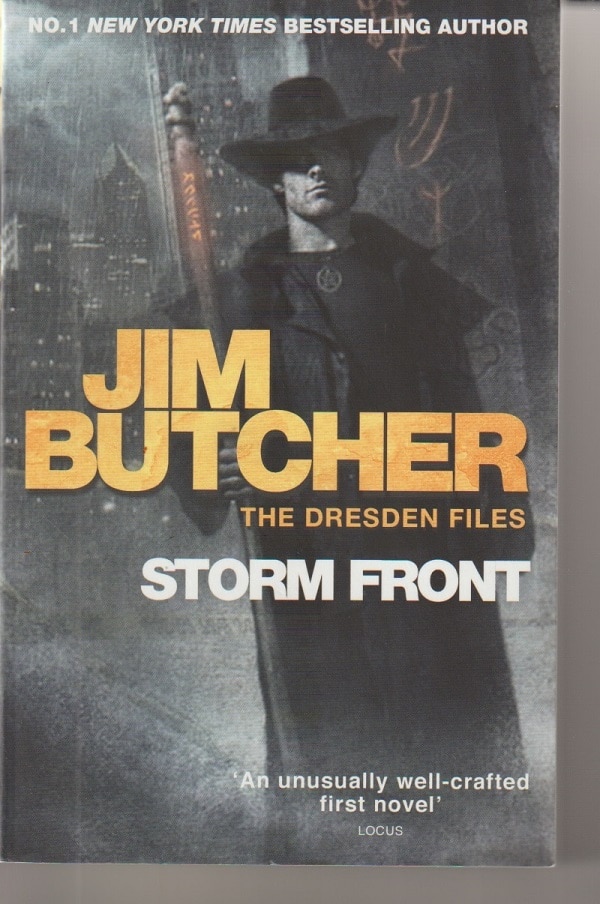Jim Butcher’s 2000 novel Storm Front, the first of the very successful series of Dresden Files novels — 17 so far with more on the horizon — is a rip-snorting, crackerjack, page-turner of urban fantasy.
It features Harry Blackstone Copperfield Dresden, the only wizard in the phone book, facing down a highly talented but untrained mage who enjoys killing his enemies and anyone who gets in his way by ripping their hearts from their bodies from the inside out, leaving behind an astonishing and astonishingly gory murder scene.
This mage, nicknamed Shadowman, employs the great power of thunderstorms in slaying his victims, and also the heightened emotions of those victims as well as of his assistants, particularly lust of all sorts. Indeed, a mob enforcer and his prostitute girlfriend are engaged in highly energetic sex when they are the first people slain in this way.
“A great job”
It’s clear, reading Storm Front, that, even before writing that first novel, Butcher already had a complex world of magic, white and black, mapped out for his series, and the result is a fictional universe that feels solid and full of surprises and hooks the reader not only through this initial book but for all the ones that have come after.

It’s also clear that Butcher has a sense of humor which he’s passed on to Harry Dresden, a smart aleck for all seasons, such as when he is on the verge of becoming the mage’s latest victim:
And so I walked through a spectral landscape littered with skulls, into the teeth of the coming storm, to a house covered in malevolent power, throbbing with savage and feral mystic strength. I walked forward to face a murderous opponent who had all the advantages, and who stood prepared and willing to kill me from where he stood within the heart of his own destructive power, while I was armed with nothing more than my own skill and wit and experience.
Do I have a great job or what?
“You’re a loser”
About fifty pages into the 307-page novel, Harry mentions in passing that he murdered his first love. By then, however, it’s clear he’s not an evil wizard. In fact, later, in the final showdown, the Shadowman tells Harry:
“You’re nothing, Dresden, nothing. You’re a loser. And do you know why?”
“Gee,” I said. “Let me think.”
He laughed harshly. “Because you’re an idiot. You’re an idealist…”
Not everyone is able to see Harry’s innate goodness. Indeed, there’s an archangel-like magic-world cop who wants to cut off Harry’s head, and an everyday-world cop who is trying to arrest him. Both think he might be the one ripping out people’s hearts from long distance.
“One of the good guys?”
A thin, awkward preteen girl is hoping that Harry’s on the right side, and she asks him if he will help her mother.
“I’m going to do everything I can to help your mom.”
She nodded. “Do you promise?”
I promised her…
She turned, with more grace and dignity than I could have managed, and started to leave. Then said, quietly, “I hope you’re one of the good guys, Mr. Dresden.”
Harry does the right thing. Nonetheless, he’s away he was on thin ice:
I’m not sure who was more certain that I was a walking Antichrist waiting to happen — the conservative branch of the White Council, the men like [that angelic cop] Morgan, or me…
By the end, the magical powers-that-be think Harry’s OK. But he knows better.
For myself, though, I’m not so sure. The power is there. The temptation is there. That’s just the way it’s going to be.
I can live with that.
A minor disappointment
Storm Front was a lot of fun to read. But also a disappointment, in a minor way.
Harry is a wizard for hire in Chicago. He’s in the Chicago phone book. He works with the Chicago cops, and he spends Storm Front going all over the city and suburbs in pursuit of information and the bad guy.
But his Chicago isn’t mine.
Which is to say that Butcher, for all his storytelling skill, has set Harry down in a non-existent Chicago that reflects the real thing in the most vaguest of ways. He makes no attempt to locate Harry in real Chicago neighborhoods, on real Chicago streets and with real Chicago places and institutions.
Harry’s Chicago does have Lake Michigan along its eastern edge. However, that edge in the real Chicago is called the lakefront. Harry calls it lakeside, a term never used in the real city until recently and now only on occasion.
I was chagrined, in a very minor way, at the absence of the real Chicago from the novel. But it is still a crackerjack novel.
And I can live with that.
Patrick T. Reardon
2.23.21
Written by : Patrick T. Reardon
For more than three decades Patrick T. Reardon was an urban affairs writer, a feature writer, a columnist, and an editor for the Chicago Tribune. In 2000 he was one of a team of 50 staff members who won a Pulitzer Prize for explanatory reporting. Now a freelance writer and poet, he has contributed chapters to several books and is the author of Faith Stripped to Its Essence. His website is https://patricktreardon.com/.
